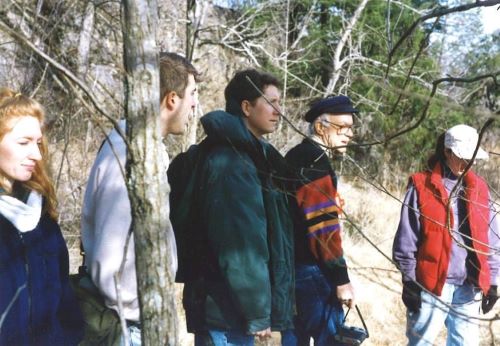WKU News
WKU Folk Studies Saddened to Announce the Passing of Professor Lynwood Montell
- Erika Brady
- Friday, December 22nd, 2023

Retired Professor of Folk Studies William Lynwood Montell passed away on December 21. WKU Folk Studies joins his family, friends, colleagues, and his many admirers in Kentucky and beyond in the deep sadness of our collective loss.
Professionally, Lynwood Montell was among the best-known folklorists and oral historians in the nation, influencing generations of students, scholars, and readers. His trademark was tight focus on study of every aspect of the culture of a specific region, gained through direct observation and contact with everyday individuals in overlooked places. He recalled being scolded by his mother for identifying his home as Tompkinsville, the Monroe county seat, when his birthplace was the tiny town of Rockbridge. Specificity remained characteristic of his approach to cultural studies.
A 1960 graduate of Western Kentucky State College (now Western Kentucky University), Montell pursued graduate degrees in folklore with minors in history and geography at Indiana University, completing his PhD in 1964. This background in both history and geography shaped his distinctive approach to oral tradition. Following graduate school, he served as professor and Academic Dean at Campbellsville College (now Campbellsville University). He was hired by WKU in 1969 in History and English, pioneering the Center for Intercultural Studies, and in 1973, helping establish a Master's degree in Folk Studies, a program now attracting students from throughout the US and the world. He retired from WKU after more than 30 years.
When he approached Carl Sauer, a highly respected professor of cultural geography, concerning his career, Sauer advised the young scholar to choose a region and investigate all aspects of life and community in the area. Montell took this advice to heart, publishing or editing 28 books addressing every aspect of local history and folkways in his native Upper Cumberland, a location straddling the border between southcentral Kentucky and northcentral Tennessee.
His studies included highly charged examinations of race relations in the post-Civil War era, the unofficial role of community-sanctioned crime, and the complex connection between oral and documentary history. As well, his publications honored the art of the everyday in such topics as vernacular architecture, foodways, and such homely pastimes as competitive marble-playing, front-porch music, and tales of firsthand supernatural encounters.
As a teacher, Montell inspired graduate and undergraduate students in both classroom and shared fieldwork experiences. Professional folklorist Jon Kay recalls one such trip when he recognized “[Montell’s] persona as ‘a scholar of the people.’” Says Kay, “I can only hope to gain a fraction of the respect and appreciation that folks in his home region have for him.” In addition to his academic commitments, Montell thoroughly enjoyed sharing his expertise through presentations in communities throughout the Commonwealth. A collector of tales, he himself was a gifted storyteller.
Indeed, long after his fieldwork has concluded, it is hardly possible to conduct research in folklore and oral history in the Upper Cumberland without being asked “Say, do you know Dr. Montell?” Like the Foxfire books, volumes of Montell’s works on ghostlore, firsthand tales of Kentucky lawyers, doctors, and funeral directors, and scores of other topics can be found not only in university libraries and scholars’ collections, but also proudly on display on the shelves of the very people whose lives he so lovingly documented.
Read more about Dr. Montell here and the funeral services here.
Contact: Erika Brady (270) 784-8659, erika.brady@wku.edu
Some of the links on this page may require additional software to view.

